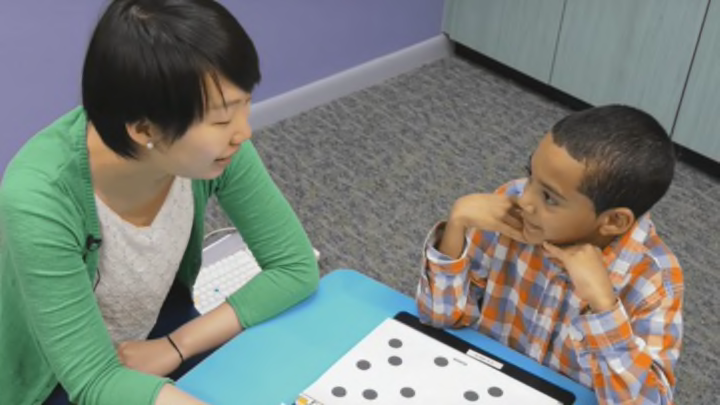Sorry, moms and dads everywhere: video games (of a certain variety) might improve your child's math skills, at least for a short period of time. According to researchers at Johns Hopkins University, kids who spent five minutes playing a computer game scored significantly higher on math tests afterward. They published their results in the Journal of Experimental Child Psychology.
Human beings may be the only animals lucky enough to take math tests, but many other species have an innate grasp of numbers. In scientific studies, salamanders, chickens, fish, and even venus flytraps have demonstrated an ability to count. And even before human babies can talk, they understand quantities. This vital knack for sizing up the world is known as an approximate number system, or ANS. This system is distinct from, say, algebra or long division, but it may make those processes easier for us to understand.
To find out, the researchers created a quick, simple ANS computer game involving colored dots. They recruited 45 kindergarten-age kids (16 girls and 24 boys) and brought them into the lab to play.
In the game, the screen flashed two groups of dots, one blue and one yellow, for just 1200 milliseconds. (Previous studies suggested that an interval of 1200 milliseconds is long enough to see the dots clearly but not long enough to count them.) After each flash, each kid was asked to identify whether they had seen more blue dots or more yellow. Half of the kids started with relatively easy flashes, in which the difference between blue and yellow was obvious, and each successive flash got more difficult. The other group’s game started out hard and got progressively easier.
After the game ended, half of the kids took an age-appropriate vocabulary test. The other half were given math questions taken from a standardized test. Five kids were knocked out of the study results because they bombed either the vocabulary (3 kids) or math tests (2 kids).
Unsurprisingly, the kids’ vocab skills did not improve after the ANS game. But their math skills did. On average, the 10 kids in the easy-questions-first group scored in the 80th percentile on their math test. Those in the hard-questions-first group averaged in the 60th percentile. A third group of kids were tested at a later date, and their dot flashes were in random order. Their math scores averaged in the 70th percentile. In other words, basic ANS training, in which questions get progressively harder, boosted kids’ math scores—at least temporarily.
Jinjing “Jenny” Wang is a JHU graduate student in psychology and lead author on the paper. “Math ability is not static,” she said in a press statement. “It’s not the case that if you’re bad at math, you’re bad at it the rest of your life. It’s not only changeable, it can be changeable in a very short period of time.”
With just 10 kids in each test group, this experiment had a very small sample size, but it’s a good place to start exploring these connections and what they might mean for learning.
Psychology and neuroscience researcher Lisa Feigenson is a co-author of the paper. “These results are really exciting to us because they show a very clear connection between an evolutionary set of abilities and a uniquely human set of formal math skills,” she says in the video above. “That raises lots of interesting questions, including how long this effect lasts and whether we can also improve children’s performance in a classroom setting.”
